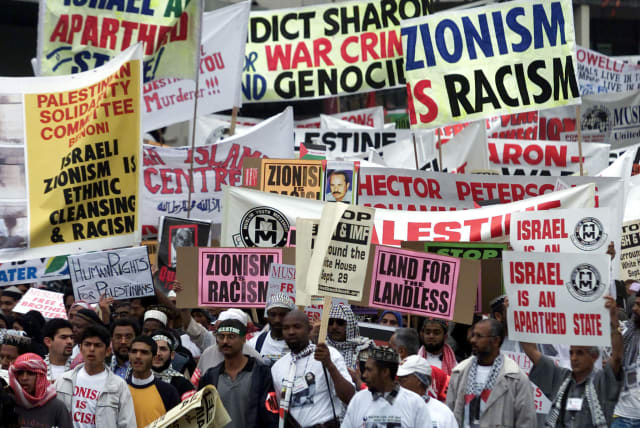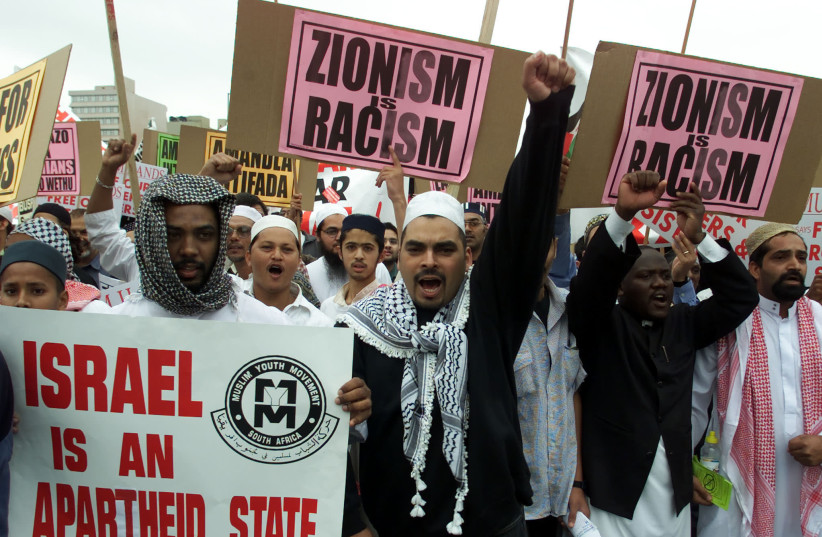How the EU and US allow anti-Israel NGOs to thrive in the UN

The anti-Israel Durban conference was held two weeks ago, where NGOs launched a campaign to delegitimize Israel.
On September 22, the UN marked the 20th anniversary of its infamous Durban Conference and the virulent NGO Forum. There, NGOs launched a campaign, ongoing to this day, to delegitimize Israel through “lawfare,” Boycott, Divestment and Sanctions, and other forms of political warfare. The anniversary event added to the much-needed discussion about antisemitic attacks on the State of Israel by politicized NGOs that claim to promote human rights and universal values.
For over two decades, NGO Monitor has worked to hold NGO donors and other stakeholders accountable in the context of the Israeli-Palestinian conflict. We have exposed powerful NGOs like Human Rights Watch and Amnesty International, which were complicit in the antisemitism at Durban, for their continued attacks on the Jewish state. The NGO network expends its resources demonizing Israel, at the expense of focusing attention on egregious violations of human rights. And Human Rights Watch leads the immoral campaign exploiting the suffering of South African apartheid to demonize Israel.
We have also highlighted the urgent need for a long-overdue review of how foreign aid has been administered in the West Bank and Gaza Strip through Palestinian NGOs. The absence of transparency and accountability mechanisms, in particular among European donors, has allowed Palestinian NGOs to abuse their mandates and enjoy unfettered access to government allocations. Significant funds have been diverted to terror, antisemitism, and political warfare against Israel.
Notably, NGO Monitor’s research found that, between 2011 to 2019, the European Union alone authorized grants of at least €38 million ($59.5 million) to NGOs linked to the Popular Front for the Liberation of Palestine, an EU and US-designated terror organization.
Some of these NGOs have also played a key role in the many biased UN Human Rights Council’s resolutions against Israel, as well as the International Criminal Court’s investigations into alleged Israeli war crimes. Recently, Palestinian NGOs lobbied intensely for the failed attempt to block US funding for Israel’s Iron Dome missile defense system.
More evidence came in 2019 when the Shin Bet security service uncovered a PFLP-linked network of NGO employees in the West Bank. Among those arrested were senior NGO officials who were alleged to have carried out the 2019 bombing attack that murdered 17-year-old Rina Shnerb. In the following 18 months, the Shin Bet searched two offices and shut down an additional two in the PFLP network.
IN LIGHT of these and other discoveries, and triggered by NGO Monitor’s research, Belgium, the Netherlands, and the European Union opened investigations. The EU commissioned the European Anti-Fraud Service, mandated to investigate fraud corruption and serious misconduct within European institutions, to start a preliminary investigation into the alleged diversion of EU development funds to the PFLP.
These reviews are important steps toward greater oversight and accountability. But, what is truly needed is a genuine and critical debate on the false presentation of these organizations as representing “civil society.” How can the donors achieve positive results on the ground, without promoting or facilitating demonization and violence?
Even US agencies such as USAID, which have more stringent anti-terror policies, often fall short of ensuring the safety of their funds. As a March 2021 Government Accountability Office report stresses, sound policy is only as effective as its implementation. In reviewing USAID West Bank and Gaza operations for 2015-2019, the GAO found that the agency did not always ensure that sub-grantees were vetted properly, and in a timely manner, for potential terror ties.
Likewise, a $723,405 USAID grant to World Vision in 2014, “to provide food security, sanitation equipment and health services to the conflict-affected areas in the Blue Nile region of Sudan” demonstrated insufficient vetting processes. In order to deliver these services, World Vision entered into a contract with the Sudan-based Islamic Relief Agency. ISRA is listed on the Treasury Department’s Office of Foreign Asset Controls sanctions list as a result of its terror-financing activity, including of Osama bin Laden and Hamas.
As the US government prepares to administer $250 million to Palestinian civil society projects through the Nita M. Lowey Middle East Partnership for Peace Act, procedures that ensure proper vetting, transparency, and accountability are paramount.
For years, NGOs have enjoyed the aura of infallibility bestowed upon them by governments, UN officials, and journalists, who seldom question their motives, tactics, or claims. This “halo effect” has allowed NGOs to directly impact on the creation and implementation of government policy and the agendas of international organizations.
Unless proper vetting and accountability mechanisms are implemented, the US runs the risk that its aid will be abused, as in Europe, by NGOs involved in terror, antisemitism, and counterproductive campaigns.
As we have urged European officials for years, we call on Congress and the State Department to critically examine the reality of the NGO influence, particularly on aid and human rights. By expanding the radius of consultation with stakeholders and experts, including real representatives of civil society, the US government, can begin to rectify these injustices.
The writer is a vice president and member of the NGO Monitor team of experts. In 2008, she received the International Leadership Prize from the American Jewish Committee, and has held senior positions in the private sector in Europe and Israel since making aliyah in 2009.
Olga Deutsch will present at The Jerusalem Post Annual Conference. To watch live on October 12 (or see the recording anytime thereafter), click here.
Jerusalem Post Store
`; document.getElementById("linkPremium").innerHTML = cont; var divWithLink = document.getElementById("premium-link"); if (divWithLink !== null && divWithLink !== 'undefined') { divWithLink.style.border = "solid 1px #cb0f3e"; divWithLink.style.textAlign = "center"; divWithLink.style.marginBottom = "15px"; divWithLink.style.marginTop = "15px"; divWithLink.style.width = "100%"; divWithLink.style.backgroundColor = "#122952"; divWithLink.style.color = "#ffffff"; divWithLink.style.lineHeight = "1.5"; } } (function (v, i) { });

